
Fynbos is a small belt of natural shrubland or heathland vegetation located in the Western Cape and Eastern Cape provinces of South Africa. This area is predominantly coastal and mountainous, with a Mediterranean climate and rainy winters. The fynbos ecoregion is within the Mediterranean forests, woodlands, and scrub biome. In fields related to biogeography, fynbos is known for its exceptional degree of biodiversity and endemism, consisting about 80% species of the Cape floral kingdom where nearly 6,000 of them are endemic. This land continues to face severe human-caused threats, but due to the many economic uses of the fynbos, conservation efforts are being made to help restore it.

Renosterveld is a term used for one of the major plant communities and vegetation types of the Cape Floristic Region which is located in southwestern and southeastern South Africa, in southernmost Africa. It is an ecoregion of the Mediterranean forests, woodlands, and scrub biome.
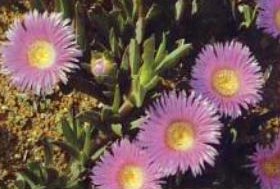
Carpobrotus muirii is a succulent perennial of the family Aizoaceae, native to the Overberg region in the Western Cape, South Africa.
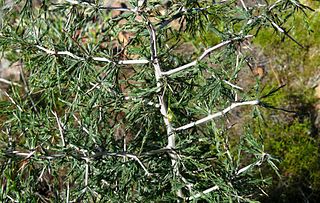
Asparagus lignosus ("Katdoring") is a thorny, spindly creeper of the Asparagus genus, that is indigenous to the Western Cape Province of South Africa.

Trichodiadema occidentale is succulent plant of the genus Trichodiadema, native to the Western Cape Province, South Africa, where it grows in rocky shale or limestone hills in the Overberg region, and especially in disturbed areas.
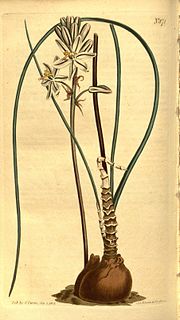
Drimia exuviata ("Gifbol") is a species of flowering plant in the family Asparagaceae, subfamily Scilloideae, indigenous to the south-western parts of South Africa.

Cyanella lutea is a species of cormous herb, native to South Africa, Lesotho and Namibia, where it grows in clay-rich or loamy soils.

Drosanthemum micans, is a succulent plant in the ice plant family, Aizoaceae, indigenous to the Robertson Karoo and Overberg regions of the Western Cape Province, South Africa.
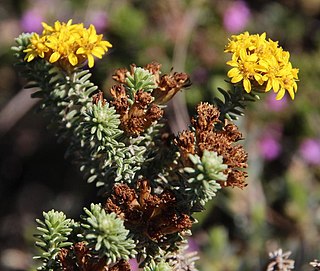
Relhania garnotii is a shrublet belonging to the daisy family, indigenous to the southern Overberg region of the Western Cape Province, South Africa.
Aspalathus steudeliana is a species of Aspalathus shrub, which occurs in the Breede River Valley and Overberg regions of the Western Cape Province, South Africa.

Asparagus striatus ("Bergappel") is a hard perennial shrublet of the Asparagus genus, that is indigenous to dry, rocky areas of South Africa.

Asparagus mucronatus ("Katdoring") is a thorny shrub or creeper of the Asparagus genus, that is indigenous to the southern Cape regions of South Africa.
Asparagus multiflorus is a robust shrub or climber of the Asparagus genus, that is indigenous to the southern Cape regions of South Africa.
Asparagus burchellii, is a shrub of the Asparagus genus, that is indigenous to dry scrub vegetion in the southern Cape region, South Africa.
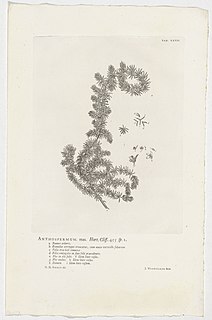
Anthospermum aethiopicum is a species of flowering plant in the family Rubiaceae, indigenous to South Africa.

Euphorbia tuberosa, commonly known as '"milkball/melkbol"' or '"wilderamenas"', is a variable geophytic plant of the family Euphorbiaceae, indigenous to the western parts of South Africa.

Drosanthemum lavisii is a succulent plant in the ice plant family, Aizoaceae, indigenous to the Overberg region of the Western Cape Province, South Africa.

Protea angustata, also known as the Kleinmond sugarbush, is a flowering shrub that belongs to the genus Protea. This plant is endemic to the south-west Cape Region of South Africa.
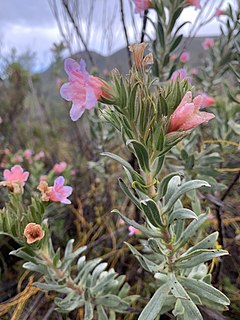
Lobostemon curvifolius, the largeflower healthbush, is a species of the forget-me-not family from South Africa.
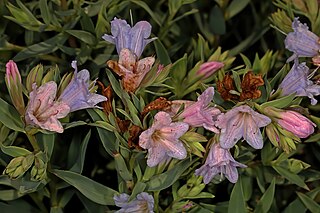
Lobostemon glaucophyllus, the smooth-leaved bush bugloss or grey healthbush, is a South African plant species belonging to the forget-me-not family.
















